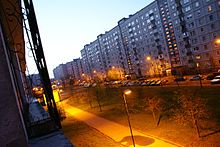Zolitūde
| Zolitūde | |
|---|---|
| Neighborhood of Riga | |

Aleksandra Bieziņa street in Zolitūde
|
|
 Location in Riga |
|
| Country |
|
| City | Riga |
| District | Zemgale Suburb, Riga |
| Area | |
| • Total | 2,888 km2 (1,115 sq mi) |
| Population (2010) | |
| • Total | 20 145 |
| Time zone | EET (UTC+2) |
| • Summer (DST) | EEST (UTC+3) |
Zolitūde (Latvian pronunciation: [ˈzɔlituːde]) is mainly an apartment house neighbourhood (or microdistrict), of Riga, the capital of Latvia, located on the city's southwestern edge. Zolitūde is a centrally planned estate, consisting mostly of prefabricated concrete block "Brutalist style" homes built in late Soviet times. Construction started in 1984, and was mostly halted in 1991, when Latvia obtained its independence from the USSR. Large parts of the population, as in similar neighbourhoods of Riga, are Russian speaking. Zolitūde had been a mixture of council housing and cooperative flats, but many properties have been privatised since the fall of the Soviet Union.
In 1991 Latvia gained independence from the USSR, and due to the end of financing from Moscow most of the state funded construction projects were halted. Few new homes were built until after Latvia joined the EU in 2004, but construction halted again as the late-2000s financial crisis spread to Latvia.
Due to the flow of investments and affordable housing credits from private parties, Riga had experienced a construction boom. Construction of newer parts of Zolitūde had begun, and 15 new apartment houses were planned, with some partly completed. Construction of detached houses had been noticed close to Zolitūde neighbourhood as well.
As with most residential neighbourhoods of Riga, Zolitūde's infrastructure was in a dilapidated state. According to the "Riga Development Plan 2006–2018"[1], the development of infastucture, services and housing had been expected. This had been seen as means to provide growth to the community of Zolitūde. 1990s improvements included two markets and a number of shops. The late 2000s had seen some improvements to local road quality, as well as renovation of both public schools in the area, which had become available by Riga council's use of EU funds. The late 2000s and early 2010s had also seen an expansion of supermarket chains in the area, as well as foreclosure of the only police office in the estate.
...
Wikipedia
